- News
- World News
- South Asia News
- 'Bangladesh is using the camera as a tool for social causes'
Trending
This story is from August 14, 2015
'Bangladesh is using the camera as a tool for social causes'
Faizal Azim from Bangladesh recently stood second in the 'National Geographic Traveler Photo contest 2015'. Earlier, the 31-year-old from Chittagong had won 25 national and international awards for his photographic talent.

Faizal Azim from Bangladesh recently stood second in the 'National Geographic Traveler Photo contest 2015'. Earlier, the 31-year-old from Chittagong had won 25 national and international awards for his photographic talent. In an e-mail interview, he tells Rohan Laik of the Economic Times.com on his win, photography and the freedom of expression across the border.
Congratulations on your win! How do you feel about the achievement and how did the National Geographic contest happen? Do you participate in such contests often?
Thank you.Frankly, it was beyond my expectation. Little did I know that this win will eventually become one of the most celebrated achievements of my photography career.
I'm delighted to have made my country proud. All of a sudden I felt so important. I have always liked travel photography, so, National Geographic was always a dream. I found out about the contest on their website and enrolled my name almost immediately, as I often do for such contests. And the rest is history!
The picture was taken last winter in Chittagong. It was a very cold and foggy morning. I reached the spot at around 6:30 am. The people in the picture are gravel workers. Their face was full of dust much like the place where they worked. Because of incessant dew from the night before, their work place's dusty glass came out like a painting in my picture.

This picture won the second prize in the ?'National Geographic Traveler Photo contest 2015'
Tell us a little about yourself.
I presently live in Chittagong where I was born and raised. I have been teaching photography at the 'Photoart Institute' for the past three years. At the moment, am working for an agency, 'Photobank Gallery', in Bangladesh, which was founded by my uncle Shoeb Faruquee.
How supportive has your family been about photography?
My mother and my younger sister Shakila have been the two inspirational pillars in my life. They are both culturally aware and thus understanding art has never been a concern. I had lost my father right after I had completed my graduation.
My maternal grandfather Mia Faruquee was an active part of the Bangladesh Awami League and a close associate of our 'Father of the Nation', Shekh Mujibur Rahman. He was a photo lover too. My uncle Shoeb Faruquee is a renowned photographer. So, maybe I was born with some of it! I have also been very lucky to have some close friends and relatives who have always supported my ambitions.

Ship breaking yard: Laborers are working at a ship-breaking yard near Chittagong, Bangladesh.
How and when did you start photography? Who influenced you?
Shoeb Faruquee, my uncle, is a 'World Press Photo' winner and the founder of the 'Photobank Gallery' in Bangladesh and has been my direct inspiration. His photographs have been published in prestigious magazines and journals around the world including Stern, Geand Telegraph. I did not start early, but his enthusiasm for photography turned out to be infectious for me.
Have you won other competition before?
Till date, I have already won more than 25 international and national awards. The 2nd Prize in National Geographic Traveler Photo contest 2015 is definitely one of the most-prized ones. Apart from that, I won the 'Atkins City Scape Award', a gold medal award at the 'Special Prize' category in the '75th Japan Asahi', '7th Emirates Photography Competition', 'Special Award- Photo-Fest Medal' in the '4th International Bursa photograph festival'- Turkey, hourly winner at 'CBRE Urban Photographer of the Year'- U.S.A, finalist in 'HIPA 2014-2015' photo contest among others.
My photos have also been exhibited at different galleries around the world including the U.S.A, Germany, London, Australia, U.A.E. Turkey, India, and Malaysia.

Unlimited Joy : Some boys are playing at a newly constructed sea port area in Chittagong, Bangladesh.
How photo-enthusiastic are young people in Bangladesh? What are the challenges that you have faced?
I think Bangladesh is a dream-land for photographers. We have a diverse culture, heritage, nature, and most importantly, a variety of people - everything a photographer craves for.
Photography is really thriving among the youth of the country. There's a lot of participation in contests as a result. People are also using the camera as a tool for social causes.
After my M.B.A from the Chittagong University, I took up a job like anyone else would do in a public firm. But soon I realized that I was never meant for it and I started missing photography. Within a few months, I had a camera in my hand and no job. But I was happy.
I started with wedding photography and after leaving the job, I went back to it. To be honest, I am pretty popular in the country as a wedding photographer.
I just heard what my mind was saying and I did that. So I don't want to say about challenges. Challenges are everywhere and it will be the part of our whole life. It's more important that to hear what is your heart saying.

Life in the circle: Some homeless people staying inside abandoned pipes. No matter how difficult life is, they still spare a smile every now and then.
Who is your favorite photographer?
Raghu Rai. I love the way he visualizes things. I feel that is the pivotal thing about photography, the vision.
What is the camera you are using? What is your dream device?
I have always been a Nikon enthusiast. I started with the Nikon F55 film camera which isn't the quite professional equipment but certainly good for beginners.
Then with the years and my ever- growing passion for photography, I started trying out professional cameras. Presently I have two cameras in my arsenal. A Nikon D700 and D800. With that, I am using three lenses Nikon 14-24 mm, Nikon 24-120 mm, Nikon 70-200 mm. But I dream of using a professional 'Leica' camera at some point in my life.
However, though my present equipment is fancy, I have acquired it recently. I had won prizes prior to using such professional gadgets too. So to the newbie's -expensive cameras do not guarantee good photography. Your eyes are the lens and the camera is an extension of your body. Keep using it!
After decades, the border dispute surrounding 162 Indian and Bangladeshi enclaves has finally got closure. Do you want to capture the moods there through your lens?
This was a monumental occasion for both nations. I would seize any opportunity to go and photograph there if the situation arose.

Where are the passengers? Before Eid thousands of people travel in the local train from one place to another. Here two guards looking on for any remaining passenger before the train leaves the station in Chittagong, Bangladesh.
This year, particularly, has been a volatile one for Bangladesh when it comes to freedom of Expression. Bloggers, artists, and free thinkers have faced censorship and death. Your view?
Bangladesh is a land of peace and I believe it always will be. Yes, few incidents have happened in the recent past to suggest otherwise, but these dark times will fade and prosperity will prevail.
As much as I appreciate the technological boom that has connected people globally, I think that we should be more conscious and respectful to each others' thoughts and beliefs. I firmly believe that only art can show us the light in such troubled times and give peace a chance.
All the pictures are taken by Faizal Azim.
Congratulations on your win! How do you feel about the achievement and how did the National Geographic contest happen? Do you participate in such contests often?
Thank you.Frankly, it was beyond my expectation. Little did I know that this win will eventually become one of the most celebrated achievements of my photography career.
I'm delighted to have made my country proud. All of a sudden I felt so important. I have always liked travel photography, so, National Geographic was always a dream. I found out about the contest on their website and enrolled my name almost immediately, as I often do for such contests. And the rest is history!
Share the story behind the picture that won the NAT Geo contest.
The picture was taken last winter in Chittagong. It was a very cold and foggy morning. I reached the spot at around 6:30 am. The people in the picture are gravel workers. Their face was full of dust much like the place where they worked. Because of incessant dew from the night before, their work place's dusty glass came out like a painting in my picture.
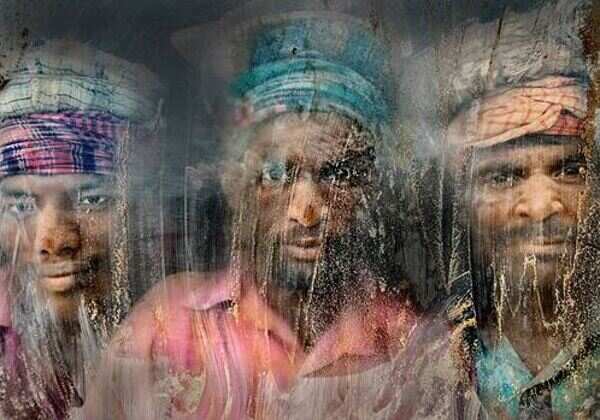
This picture won the second prize in the ?'National Geographic Traveler Photo contest 2015'
Tell us a little about yourself.
I presently live in Chittagong where I was born and raised. I have been teaching photography at the 'Photoart Institute' for the past three years. At the moment, am working for an agency, 'Photobank Gallery', in Bangladesh, which was founded by my uncle Shoeb Faruquee.
How supportive has your family been about photography?
My mother and my younger sister Shakila have been the two inspirational pillars in my life. They are both culturally aware and thus understanding art has never been a concern. I had lost my father right after I had completed my graduation.
My maternal grandfather Mia Faruquee was an active part of the Bangladesh Awami League and a close associate of our 'Father of the Nation', Shekh Mujibur Rahman. He was a photo lover too. My uncle Shoeb Faruquee is a renowned photographer. So, maybe I was born with some of it! I have also been very lucky to have some close friends and relatives who have always supported my ambitions.
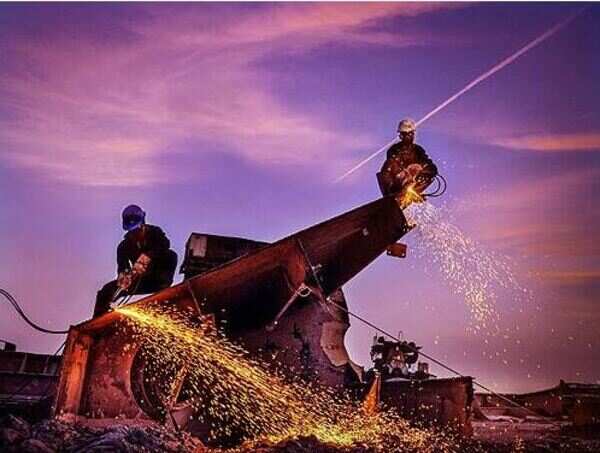
Ship breaking yard: Laborers are working at a ship-breaking yard near Chittagong, Bangladesh.
How and when did you start photography? Who influenced you?
Shoeb Faruquee, my uncle, is a 'World Press Photo' winner and the founder of the 'Photobank Gallery' in Bangladesh and has been my direct inspiration. His photographs have been published in prestigious magazines and journals around the world including Stern, Geand Telegraph. I did not start early, but his enthusiasm for photography turned out to be infectious for me.
Have you won other competition before?
Till date, I have already won more than 25 international and national awards. The 2nd Prize in National Geographic Traveler Photo contest 2015 is definitely one of the most-prized ones. Apart from that, I won the 'Atkins City Scape Award', a gold medal award at the 'Special Prize' category in the '75th Japan Asahi', '7th Emirates Photography Competition', 'Special Award- Photo-Fest Medal' in the '4th International Bursa photograph festival'- Turkey, hourly winner at 'CBRE Urban Photographer of the Year'- U.S.A, finalist in 'HIPA 2014-2015' photo contest among others.
My photos have also been exhibited at different galleries around the world including the U.S.A, Germany, London, Australia, U.A.E. Turkey, India, and Malaysia.
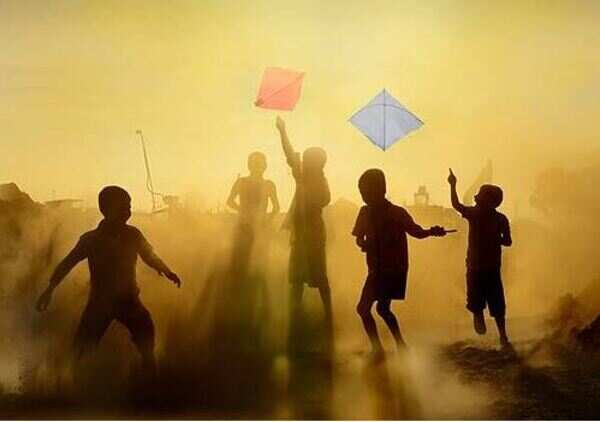
Unlimited Joy : Some boys are playing at a newly constructed sea port area in Chittagong, Bangladesh.
How photo-enthusiastic are young people in Bangladesh? What are the challenges that you have faced?
I think Bangladesh is a dream-land for photographers. We have a diverse culture, heritage, nature, and most importantly, a variety of people - everything a photographer craves for.
Photography is really thriving among the youth of the country. There's a lot of participation in contests as a result. People are also using the camera as a tool for social causes.
After my M.B.A from the Chittagong University, I took up a job like anyone else would do in a public firm. But soon I realized that I was never meant for it and I started missing photography. Within a few months, I had a camera in my hand and no job. But I was happy.
I started with wedding photography and after leaving the job, I went back to it. To be honest, I am pretty popular in the country as a wedding photographer.
I just heard what my mind was saying and I did that. So I don't want to say about challenges. Challenges are everywhere and it will be the part of our whole life. It's more important that to hear what is your heart saying.
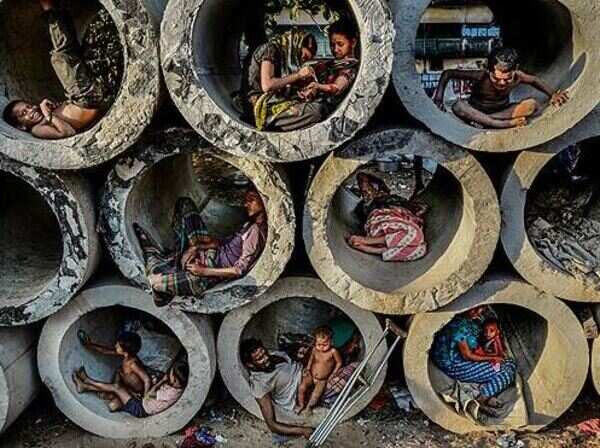
Life in the circle: Some homeless people staying inside abandoned pipes. No matter how difficult life is, they still spare a smile every now and then.
Who is your favorite photographer?
Raghu Rai. I love the way he visualizes things. I feel that is the pivotal thing about photography, the vision.
What is the camera you are using? What is your dream device?
I have always been a Nikon enthusiast. I started with the Nikon F55 film camera which isn't the quite professional equipment but certainly good for beginners.
Then with the years and my ever- growing passion for photography, I started trying out professional cameras. Presently I have two cameras in my arsenal. A Nikon D700 and D800. With that, I am using three lenses Nikon 14-24 mm, Nikon 24-120 mm, Nikon 70-200 mm. But I dream of using a professional 'Leica' camera at some point in my life.
However, though my present equipment is fancy, I have acquired it recently. I had won prizes prior to using such professional gadgets too. So to the newbie's -expensive cameras do not guarantee good photography. Your eyes are the lens and the camera is an extension of your body. Keep using it!
After decades, the border dispute surrounding 162 Indian and Bangladeshi enclaves has finally got closure. Do you want to capture the moods there through your lens?
This was a monumental occasion for both nations. I would seize any opportunity to go and photograph there if the situation arose.
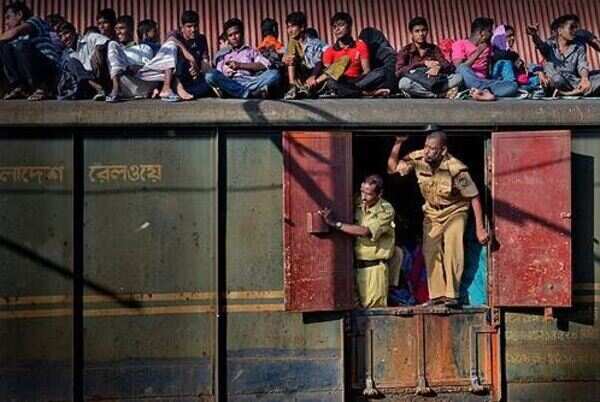
Where are the passengers? Before Eid thousands of people travel in the local train from one place to another. Here two guards looking on for any remaining passenger before the train leaves the station in Chittagong, Bangladesh.
This year, particularly, has been a volatile one for Bangladesh when it comes to freedom of Expression. Bloggers, artists, and free thinkers have faced censorship and death. Your view?
Bangladesh is a land of peace and I believe it always will be. Yes, few incidents have happened in the recent past to suggest otherwise, but these dark times will fade and prosperity will prevail.
As much as I appreciate the technological boom that has connected people globally, I think that we should be more conscious and respectful to each others' thoughts and beliefs. I firmly believe that only art can show us the light in such troubled times and give peace a chance.
All the pictures are taken by Faizal Azim.
End of Article
FOLLOW US ON SOCIAL MEDIA











